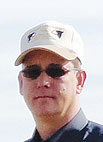
Rod and Jamie Garman of Ground Zero Farms in Watts, Okla., run and operate Ground Zero Construction in Siloam Springs, Ark. “We got started with a construction company in 2004. We mainly do dirt work, utilities and build subdivisions,” Rod said. He bought about 350 acres to start his ranch. “As the construction company grew, we just kept buying land around us and own around 1,800 acres now,” he said. Ground Zero Farms also leases another 2,000 acres. “We run about 350 registered Red and Black Hereford cows and about 450 commercial cows,” he added.
“My wife and I have been married for 21 years this summer. We have two boys who are 15 and 18 a freshman and senior in high school,” he said. “I pretty well handle the construction company. My wife, her brother and our nephew handle everything on the farm. It is a family business.” Mark Kelley, Jamie’s brother is the ranch manager. “Mark has been in the cattle business since he was a kid. That is all he has ever done. He and Jamie take care of everything,” Rod said.
“We breed to calve both in the spring and the fall. We AI (artificially inseminate) most of our cows the first time and then use clean up bulls,” Rod said. “We like black baldies. Black baldy calves top the sale every time we sell our cattle. Eighty percent of our commercial cows are black baldies.” Ground Zero Farms was having problems with low weaning weights. “We’ve started using Angus bulls. We run about 30 Angus bulls,” he said. “We don’t background our commercial cattle. We usually wean them for 60, 90 or 120 days and then sell them when they are yearlings.” Ground Zero Farms is trying to build their registered herd and keeps their registered heifers.
They sell their registered bulls keeping them until they are yearlings.
Ground Zero Farms raises their cattle on their own farm. “They never go to a feedlot. They stay right here on our fescue and run up and down these hills on the rocks,” Rod said. “When we sell our bulls to commercial buyers, they can take our bulls anywhere they want to go and they will survive,” he said. “We don’t pamper our bulls. Anyone can buy them and take them anywhere. They will thrive.”
Ground Zero Farms raises registered Black Hereford cattle but it wasn’t easy to get started. They are still building their herd. “I found a breeder online and drove to Texas to buy three Black Hereford bulls,” Rod said. “We couldn’t buy any females.” The American Black Hereford Association was started in 1994. “It was basically a very small association when we got into this,” he said. “There were very few breeders. Almost none of the breeders were selling females because they were trying to build their herds.”
Ground Zero Farms decided to buy Red Hereford females and breed them to Black Hereford bulls which, they think results in better genetics most of the time. “When we got started, we were looking for Red Hereford females that were open and had baby calves at their side,” Rod said. Rod found a producer having a production sale in Missouri. “He had about 86 pairs. We bought those pairs and he canceled his sale,” he said. “We started from there.” Ground Zero Farms holds an annual heifer sale in Kansas City with the American Black Hereford Association and consign 15 to 20 heifers in the sale. “We are lifetime members of the American Black Hereford Association. With our cow numbers, we are one of the largest Black Hereford breeders in the nation,” Rod said. “We sell everything by private treaty.”
Rod and Jamie’s sons show at local fairs and in Fort Smith, Fort Worth, Louisville, Denver and Kansas City. “We’ve got one cow who was Grand Champion Cow/Calf pair in Denver about two years ago. We have another cow that was Division Champion in Denver, Division Champion in Kansas City-Louisville and Fort Worth,” he said. One of their bulls was Reserve Grand Champion at the Texas State Fair.
Ground Zero Farms’ goal is to have 500 registered Black Hereford cows and to maintain that number. “We want to improve the quality through better genetics. The Hereford breed is so much better than it was 20 years ago,” Rod said. They have a flushing program; use AI and ET (embryo transfer). They also buy eggs and semen from other Black Hereford programs to help improve their program using their registered and commercial cows. “We buy embryos from other breeders to use in our commercial cows,” he said. “Someone may have a $200,000 cow. We can’t afford to buy her so; we can get a flush out of her. The ET program we have with our donor cows and the technology we have today has really helped us and everyone in the registered business a lot.”







